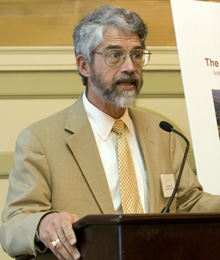 Sen. James Inhofe of Oklahoma, ranking Republican on the Senate Environment and Public Works Committee, says he believes some of his Senate colleagues share the view expressed by White House science adviser John P. Holdren in a 1973 book that human fetuses do not become “human beings” until sometime after they are born.
Sen. James Inhofe of Oklahoma, ranking Republican on the Senate Environment and Public Works Committee, says he believes some of his Senate colleagues share the view expressed by White House science adviser John P. Holdren in a 1973 book that human fetuses do not become “human beings” until sometime after they are born.
Holdren co-authored Human Ecology: Problems and Solutions with Paul R. Ehrlich and Anne H. Ehrlich in 1973. The book calls for a “massive campaign” to “de-develop the United States” and concludes that redistribution of wealth “both within and among nations is absolutely essential.”
Flashback: Holdren: Infants are not human beings
On page 235 of the book, in a chapter titled “Population Limitation,” Holdren and his co-authors wrote: “The fetus, given the opportunity to develop properly before birth, and given the essential early socializing experiences and sufficient nourishing food during the crucial early years after birth, will ultimately develop into a human being. Where any of these essential elements is lacking, the resultant individual will be deficient in some respect.”
Holdren holds a Senate-confirmed position as director of the White House Office of Science and Technology Policy and is the top science adviser to President Barack Obama.
CNSNews.com asked Sen. Inhofe in a video interview if he believed that Holdren should come to the Senate and explain whether he still believes these words in his book and what he meant by them. Inhofe, who is pro-life, responded that he believed Holdren’s view that a fetus does not develop into a human being until sometime after birth is shared by some members of the Senate.
“There are members of the Senate who would probably agree with that,” said Inhofe. “I mean, those of us who believe—and, scripturally, we, obviously, we are on solid ground—that life begins at conception. Many members of the Senate don’t believe that. And that’s why you are getting into the big abortion argument.”
Inhofe said that he not only thought some of his colleagues did not believe a fetus develops into a human being until sometime after birth, but said he thought some of his colleagues would actually state that this was their belief.
“I think they would actually tell you that,” said Inhofe.
“They would be candid enough to actually say that?” CNSNews.com asked.
“I think they would, yes,” said Inhofe.
CNSNews.com has asked the White House Office of Science and Technology Policy to make John Holdren available for a video interview about his past writings on human ecology, population, and the environment. The invitation has not been accepted.
No comments:
Post a Comment